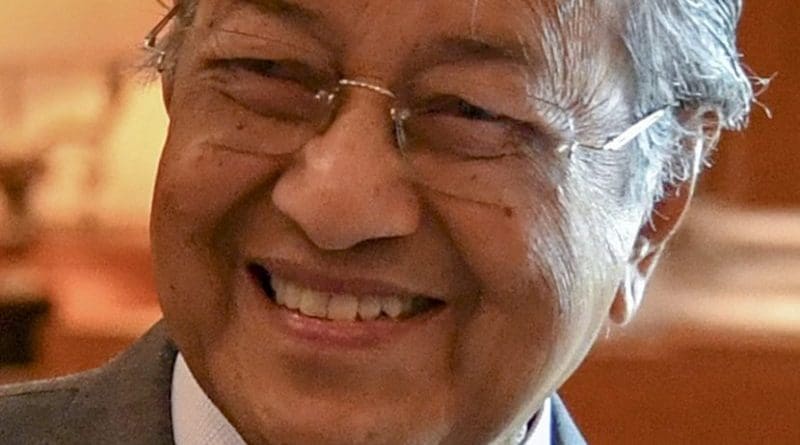Malaysia’s Mahathir: ‘No Way’ Thai Deep South Gets Autonomy Or Independence
By BenarNews
By Nani Yusof
Malaysia will carry on with brokering peace talks in Thailand’s insurgency-stricken Deep South, but Bangkok will never agree to autonomy or independence for the region, Prime Minister Mahathir Mohamad told BenarNews in an exclusive interview.
BenarNews sat down with Mahathir in New York on Thursday, on the sidelines of this week’s United Nations General Assembly. Mahathir said Malaysian facilitators would work with Gen. Wanlop Rugsanaoh, the outgoing head of Thailand’s National Security Council, whose appointment to lead the Thai delegation in the southern peace talks was announced the same day.
“We will try to work together with this new leader, because we only want to find ways to end the unrest because, in our opinion, there is no way that Thailand will allow them to have autonomy or independence and it could lead to Thailand becoming hardline, and many more will die,” Mahathir said.
“I look highly upon people who are brave and patriotic, but what is the use if you can’t achieve your goals?”
Mahathir confirmed that Malaysia planned to have a role in efforts to broker peace led by facilitator Abdul Rahim Noor.
“We will continue our efforts to persuade Thai participants to stop actions that cause many people to die, people who are not guilty, people who are not in the military. They need to consider this, if not, the world will be angry with them,” he told Benar.
“On the other hand, as we know, we worked so many years in the Philippines, and at last we succeeded because the Duterte government agreed to give autonomy, but not Thailand. They have said from the start, no autonomy,” the prime minister said.
He was alluding to Malaysia’s role in helping bring about a 2014 peace deal between Manila and the Moro Islamic Liberation Front guerrilla group that led to the creation this year of an autonomous Muslim region in the southern Philippines.
“And we also think war won’t result in autonomy or independence, so it’s better to find a safer way, to accept the reality that Thailand will not allow them freedom,” Mahathir said.
In southern Thailand, Malaysia has facilitated peace efforts between the government and MARA Patani, a panel of negotiators representing Deep South rebel groups and factions, since 2015.
Kuala Lumpur had also brokered direct peace talks between Thailand and Barisan Nasional Revolusi (BRN), the largest of the armed separatist groups in the southern border region. But those efforts stalled in December 2013 under a civilian-led government, which was toppled in a military coup five months later.
The earlier talks hit a snag when BRN chief negotiator Hassan Bin Toyib announced five demands via a video posted on YouTube that the government rejected. In the video, he demanded that Thailand grant sovereignty to all territory within the Deep South and recognize “the Patani Malay nation.”
The talks with MARA Patani appeared to have also stalled. So far, they have yielded no breakthroughs and have been dogged by allegations that hardcore BRN leaders, who command guerrillas in the field, were not participating and did not support the effort.
In an interview with BenarNews in July, Sukree Hari, who led BRN representatives on the MARA Patani panel until he resigned in May, slammed the Thai government over the negotiations.
“Whatever was agreed together at the negotiating table, the Thai side was not willing to sign, and that is clear proof that the Thai side was just pretending in the negotiations, playing for time,” he said during the interview in northern Malaysia.
In March, in an apparent criticism of Malaysia’s role as facilitator of peace talks, the BRN released a video to mark its 59th anniversary where it asked the international community to help solve the conflict, while it pledged to continue with its separatist fight.
“So, to all Patani people, let us continue this struggle until the end,” said the lone BRN speaker who identified himself as Abdul Karim Khalib in videos released by the group in 2013. “Be patient of suffering, be patient of difficulties. Sustainable peace is [a]waiting us.”
When asked to comment on BRN’s rejection of Malaysia as a peace broker, Mahathir expressed openness in allowing other countries or parties to mediate between the warring sides.
“Yes, it’s possible and if it’s accepted by both parties, the insurgents and the government, if they agree, we have no objection to anyone who is capable of being the facilitator,” he said.
Thai lawmakers want to participate
In June, a trio of politicians from the Deep South had called for parliamentarians to be able to participate in future peace talks.
Areepen Utarasint, who retired from parliament after nine terms representing Narathiwat province, said at the time that residents wanted to feel like they were represented in Bangkok.
Sukarno Matha, a current Deep South MP from the opposition Prachachart Party, said he supported Areepen’s call.
“In the past, the committee led by the southern army commander, did not open a room for local politicians,” Sukarno told BenarNews. “There should be MPs included in committees which could have roles in the peace talks.”
The Malay-speaking and predominantly Muslim Deep South borders Malaysia and encompasses Pattani, Narathiwat and Yala provinces as well as four districts in Songkhla province. Nearly 7,000 people have been killed in violence in the region since the separatist insurgency reignited in early 2004.

